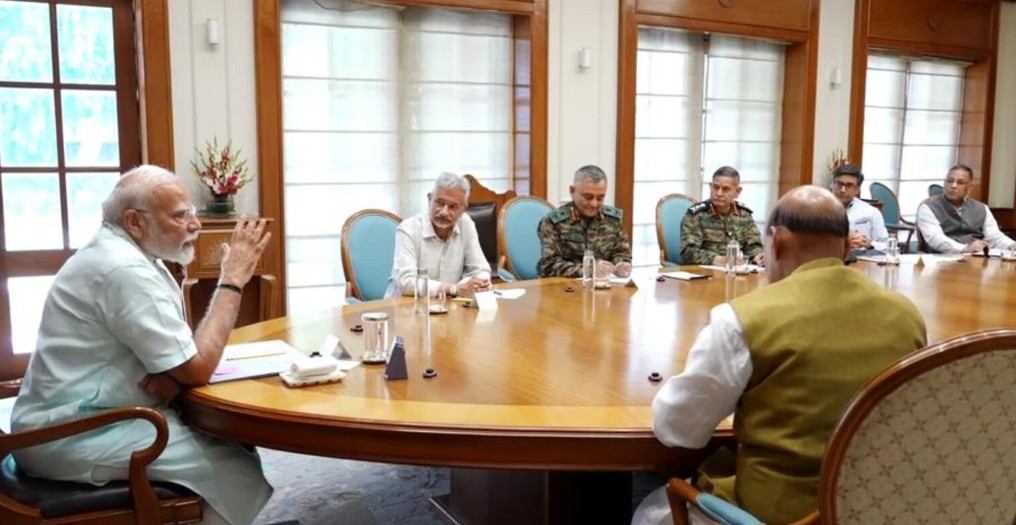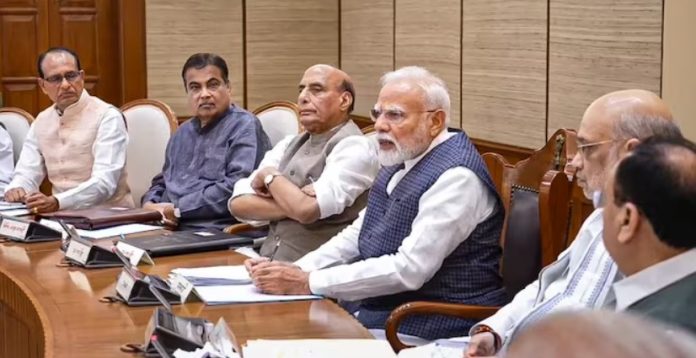The highest echelons of Indian governance converged in the nation’s capital today for a pivotal cabinet meeting, convened by Prime Minister Narendra Modi, a gathering that was anticipated with bated breath across the country. The urgency stemmed not just from the critical national security review following the recently concluded “Operation Sindoor,” a decisive military action that underscored India’s unwavering stance against cross-border threats, but also from the symbolic backdrop of the Indian Premier League (IPL) final, scheduled for later this evening, a spectacle that captivates the nation’s collective consciousness. This juxtaposition of somber strategic deliberations with the exhilarating fervor of a national sporting event painted a poignant picture of a nation simultaneously confronting grave security challenges and reveling in moments of shared joy.
At the heart of the cabinet’s agenda was a comprehensive debrief on “Operation Sindoor,” a meticulously planned and executed military maneuver that has garnered significant attention and commendation since its completion. While specifics of the operation remained under wraps for reasons of national security, it is widely understood to have been a powerful, targeted response to a series of escalating provocations originating from across India’s western frontier. Sources close to the Ministry of Defence hinted that “Operation Sindoor” involved precision strikes against several high-value terror infrastructure sites and training camps situated in Pakistan-occupied Kashmir (PoK) and other critical areas, effectively dismantling networks that had long posed a threat to India’s internal security. The operation, executed with surgical precision by India’s Special Forces and intelligence agencies, reportedly neutralized key terrorist commanders and significantly degraded the capabilities of various extremist groups, thereby sending an unequivocal message that India would no longer tolerate proxy warfare or cross-border terrorism. The success of “Operation Sindoor” is seen as a reassertion of India’s robust, proactive defense posture, marking a significant shift in its response paradigm to external threats.

The cabinet meeting, therefore, was primarily focused on analyzing the immediate aftermath of this operation, assessing its strategic impact, and charting the nation’s course for regional stability. Discussions likely centered on the geopolitical ramifications of the strikes, potential responses from neighboring countries, and strategies to further secure India’s borders. Key ministers from Defence, Home Affairs, External Affairs, and Finance were present, deliberating on measures to enhance surveillance, fortify existing security infrastructure, and reinforce India’s diplomatic outreach on the issue of terrorism. The Prime Minister, known for his resolute stance on national security, was expected to emphasize the importance of sustained vigilance and the need for continuous upgradation of India’s defense capabilities, ensuring that the successes achieved in “Operation Sindoor” translate into long-term security dividends for the nation.
Yet, even as these weighty matters occupied the highest levels of government, the nation collectively held its breath for another monumental event scheduled for the evening: the final of the 18th season of the Indian Premier League. The contest, set to unfold at the sprawling Narendra Modi Stadium in Ahmedabad, promised a thrilling encounter between two of the league’s most passionately supported franchises, Royal Challengers Bengaluru (RCB) and Punjab Kings (PBKS). For fans across India, particularly in cricket-mad Punjab, the clash represented the culmination of two months of exhilarating cricketing action, filled with breathtaking performances, nail-biting finishes, and the unique fusion of sport and entertainment that the IPL has mastered.
The IPL final is more than just a cricket match; it is a cultural phenomenon that unites millions across diverse linguistic and regional lines. Families gather around television screens, friends convene in restaurants, and entire communities buzz with an electric anticipation that transcends everyday concerns. This evening’s final was particularly significant as both RCB and PBKS had historically sought their maiden IPL title, adding an extra layer of emotional intensity to the contest. The narrative of two underdog teams finally reaching the pinnacle of the tournament resonated deeply with fans, making the occasion a truly historic one for Indian cricket.
The subtle juxtaposition of the gravitas of the cabinet meeting with the widespread excitement surrounding the IPL final offered a unique lens into the multifaceted reality of modern governance. While the Prime Minister and his cabinet grappled with matters of national security and strategic consequence, millions of ordinary citizens were preparing to immerse themselves in the joyous spectacle of sport. This duality highlights the challenge and nuance of leadership: to simultaneously safeguard the nation’s interests and nurture its spirit. It underscores how, even in moments of geopolitical tension, the rhythm of national life, encompassing both serious affairs of state and moments of collective leisure, continues unabated.
The successful execution of “Operation Sindoor” undoubtedly provided a boost to national morale, reaffirming faith in the nation’s defense capabilities and leadership. This sense of confidence, perhaps, allowed the public to more fully embrace the celebratory mood of the IPL final, knowing that the nation’s security bedrock remained firm. The Prime Minister, aware of the public pulse, has often acknowledged the role of such sporting events in fostering national unity and providing moments of collective joy. While no direct mention of the IPL final was expected within the formal proceedings of the cabinet meet, the pervasive excitement certainly formed an ambient backdrop to the day’s critical deliberations.
Ultimately, today’s events in India painted a compelling picture of a nation confronting its challenges with determination while simultaneously allowing its people to participate in unifying cultural celebrations. The vital cabinet meet, born from the strategic necessity following “Operation Sindoor,” represented India’s resolute commitment to national security and its proactive defense posture. The IPL final, on the other hand, symbolized the vibrant spirit of the nation, its passion for sport, and its capacity for collective joy and celebration. Together, these events underscored the dynamic and complex reality of contemporary India, a nation balancing geopolitical imperatives with the everyday rhythms of its diverse and spirited populace. The outcomes of both the cabinet’s decisions and the cricket match would, in their own distinct ways, shape the national narrative for the days and weeks to come.


